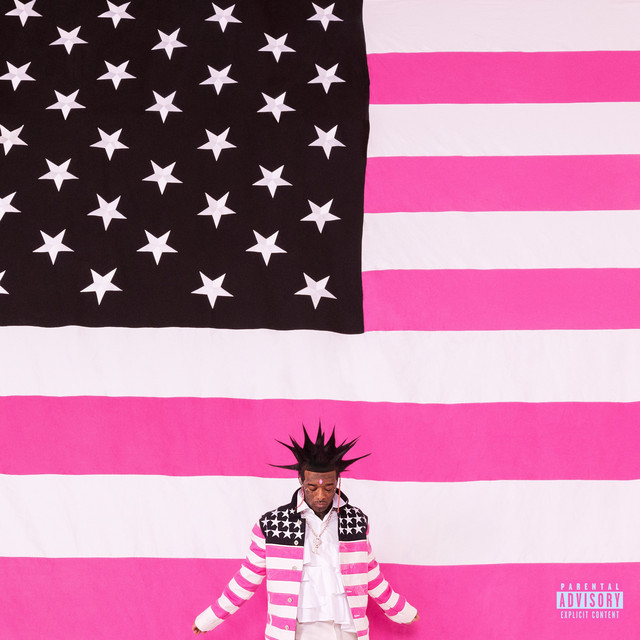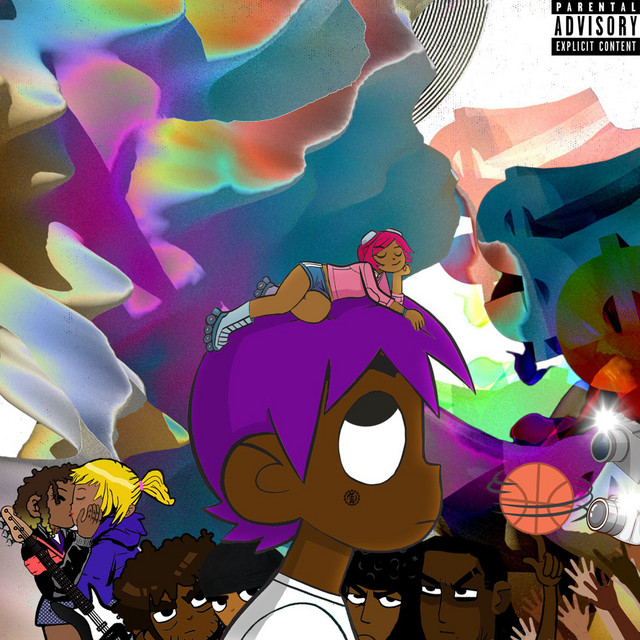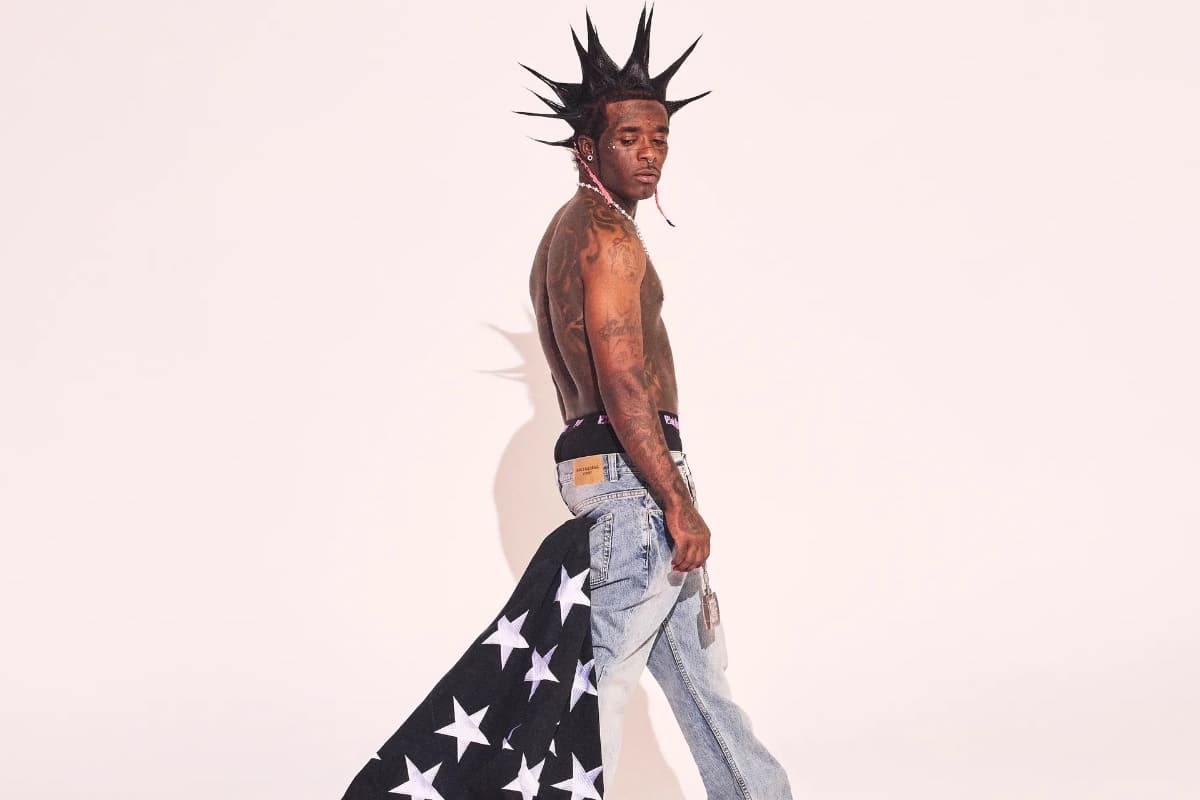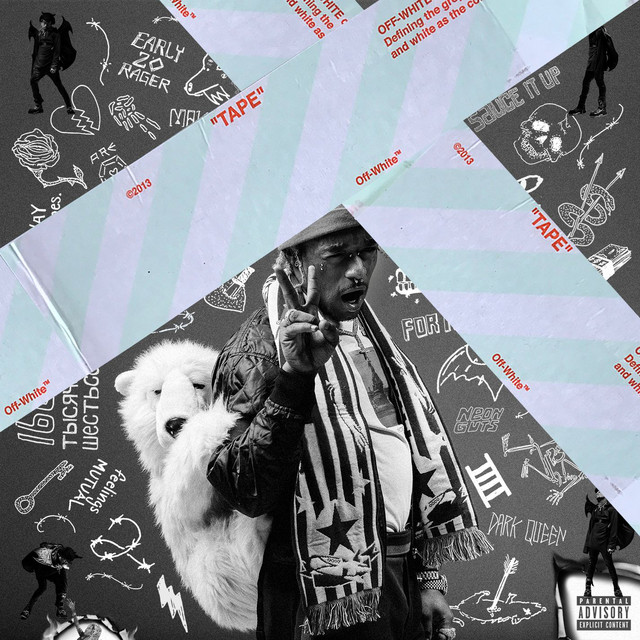Released: 2023
Label: Generation Now/Atlantic
Featuring: Travis Scott, Nicki Minaj, Snow Strippers, Bring Me The Horizon, Don Toliver, BABYMETAL
Albums ain’t just music dropped on a playlist – they the scriptures of an artist’s soul, the raw testament of their hustle and where their head’s at. Lil Uzi Vert’s “Pink Tape”? That album hits different. Dropped in 2023 on Generation Now/Atlantic, it ain’t just another set of bangers; it’s Uzi baring it all, the success, the pain, the regrets, the come-up.
This tape packed with heavy hitters – Travis Scott, Nicki Minaj, even Snow Strippers and Bring Me The Horizon? Uzi ain’t afraid to switch up the flow, each collab dropping their own heat into the mix.
From the cocky anthem “Flooded The Face” to the vulnerable “Mama, I’m Sorry”, to the defiant rise in “Patience” with Don Toliver, this ain’t background noise. Uzi’s world unfolds track by track – his growth, his demons, the whole damn whirlwind. “Pink Tape” showcases his lyrical range, that freaky energy… It’s fire.
So lock in, let’s dissect this masterpiece. “Flooded The Face” to “Shardai” – we about to break down the heart and soul of Lil Uzi Vert’s “Pink Tape.”
1 Flooded The Face
Through a barrage of flexes, Uzi narrates the transformation from struggle to splendor, marking his ascent with lavish symbols like “Flooded the face, matted the Wraith.” The track pulses with the energy of newfound wealth and the freedom it brings, juxtaposing past hardships against the current state of unlimited luxury and influence. A standout line that epitomizes this swaggering confidence is when he asserts, “Got a new house, unlimited space,” highlighting not just physical acquisitions but the boundless potential he now enjoys. It’s a testament to Uzi’s unapologetic embrace of success, couched in the ostentatious display of riches that has come to define a segment of hip-hop culture. Beyond the glittering surface, the song is a narration of victory over adversity, a theme that resonates deeply with many of Uzi’s fans.
2 Suicide Doors
3 Aye
Features: Travis Scott
Uzi kicks things off flaunting diamonds and invincibility in the face of opposition, embodying the spirit of triumph that riddles the track. Travis Scott elevates the vibe, bringing in slick references to his lifestyle and success, ensuring the track pulsates with a vibe of invincibility and recklessness. A standout line, “Sometimes I feel like the target, But fuck it, this time I go harder,” encapsulates the defiant attitude that defines the song, portraying an unyielding resolve to overcome any adversity while riding high on the laurels of success and extravagance.
4 Crush Em
The repeating mantra of “Crush ’em” not only sets the tone for Uzi’s relentless domination in the rap game but mirrors the intensity of his experiences and relationships. Lyrics like “Swervin’ and smashin’ all over the place just like I got road rage” and “All of these diamonds on top of my watch, this bitch ain’t got no face” vividly paint the picture of a fast life filled with luxury and a disregard for the conventional. Yet, it’s his line, “I’m runnin’ through so many hoes, I just need a Heisman,” that hits hard, cleverly summarizing his nonchalant attitude towards his immense success and the fleeting relationships that come with it. It’s a track that embodies Uzi’s unique blend of arrogance and vulnerability, set against a backdrop of unapologetic wealth and fame.
5 Amped
6 x2
7 Died and Came Back
Uzi’s lyrics slide from casually flaunting wealth and lifestyle – contrasting rigatoni with spaghetti and racks with fetti – to profound statements of personal resurgence and confrontation with adversaries. It’s a narrative that vacillates between self-assuredness and vulnerability, a reflection on the cyclical nature of conflict, loyalty, and self-identity in the rap game. Standout in its lyrical journey is the assertion, “I died and came back / Your voice don’t sound the same, get your range back,” laying bare the transformation and rebirth Uzi claims, asserting dominance over grief and rivals. The track is an emblem of Uzi’s resilience and an intricate tapestry of his experiences, declarations, and the complexities of navigating fame.
8 Spin Again
With a standout line like “Spinnin’ shit just like I am a ceiling fan,” Uzi encapsulates the track’s essence – it’s all about the endless cycle of success, excitement, and dominance. The repetitive mantra “Spin again, spin again, spin again” doubles down on the notion of relentless forward motion, whether it’s showing off his prowess, navigating relationships, or dealing with opposition. The lyrics skate through a series of braggadocious claims, from changing numbers on a whim to pulling up in a conspicuous ride, encapsulating the high-flying, untouchable aura Uzi embodies. Far from monotony, the track’s vivid imagery and Uzi’s dynamic delivery make each boast feel like a fresh spin, keeping listeners locked in for another ride.
9 That Fiya
With the continual echo of “.44 on my body, bitch, this shit, it hit like,” Uzi flexes the lethal force he commands, both in terms of firepower and lyrical prowess. The juxtaposition of material wealth, represented by exclusive brands and luxury cars, against a backdrop of violence and gang allegiance, paints a vivid picture of a rapper who has navigated the perilous pathways to success. Lines like “If you shoppin’ at Wafi, damn (what?) / I don’t do Wafi ’cause the shit don’t dance,” and “Lil Uzi Vert is a psycho / I’m a Blood, then that bitch chain gone,” showcase Uzi’s unabashed braggadocio and the high stakes of the game he plays, both metaphorically and in the literal sense. This track doesn’t just burn; it blazes with the intensity of Uzi’s unfiltered experiences, setting the scene ablaze with raw energy and relentless ambition.
10 I Gotta
Uzi skates through verses laden with luxury, uncompromising ambition, and a swagger that’s hard to contest. The track pulsates with the hunger of a rapper who’s climbed from the trenches to the top echelons of hip-hop aristocracy, never shying away from the spotlight. A standout line, “I shoot my shot, shit go swish,” encapsulates the essence of Uzi’s journey—each move calculated, each venture into the unknown hitting the mark with precision. The bravado bleeds through as he asserts his dominance over the game and the lavish lifestyle that accompanies it, leaving no room for doubt about his prowess in this rap game or the lavishness that comes with his success.
11 Endless Fashion
Features: Nicki Minaj
Verses laced with designer references from Chrome Hearts to Carhartt, underscored by Uzi’s deal with the devil for haute couture, paint a lavish tapestry of rap glamour. Yet, it’s Minaj’s verse that truly crystallizes the song’s theme, merging her signature blend of wit with cultural critiques. A standout line, “I was really in the field with Karl Lager (oop, shh), now it’s Heaven campaigns (R.I.P.),” not only pays homage to the late great Karl Lagerfeld but also nods to Nicki’s own evolution within and impact on the fashion world. This track isn’t just about flexing designer labels; it’s a celebration and critique of the fashion industry’s exclusivity, legacy, and influence on identity.
12 Mama, I’m Sorry
The track oscillates between Uzi’s hard-earned swagger and an undercurrent of remorse, particularly towards their mother. With a standout line like, “I said Mama, I’m sorry, I cannot feel my body, yeah,” Uzi encapsulates the paradox of seeking oblivion yet longing for connection and forgiveness. The lyrics reflect on their high-octane lifestyle, marked by parties, drugs (“I’m off two shots and Molly”), and material success, but underscored by a poignant awareness of the personal cost. Uzi’s admission is not just about the physical numbness induced by substances but signifies a deeper, emotional disconnection, making the track a candid lament of fame’s isolating bubble.
13 All Alone
Uzi’s articulation of loneliness amidst fame and fortune, contrasting material success with emotional voids, is a recurring theme in hip-hop that he masters with his own flair. Key lines like “I know that you’re all alone, That’s why you tryna call my phone, yeah” encapsulate the duality of desiring connection while embracing the aloofness success brings. Uzi doesn’t shy away from flaunting his wealth and attractiveness, yet these boasts are underscored by a sense of detachment, further emphasized when he states, “I don’t even have no fucking plans, son.” This line particularly resonates, serving as a candid admission of aimlessness despite being at the pinnacle of success. “All Alone” thus stands out as a reflective piece, offering a glimpse into the internal struggles behind Uzi’s vibrant exterior.
14 Nakamura
Flexing his lyrical prowess, Uzi navigates through the trials of past relationships, industry politics, and the relentless pursuit of success with a defiant, battle-hardened attitude. The standout line, “Feel like Nakamura jumpin’ off the top, dog,” not only evokes the high-flying, risk-taking style of professional wrestler Shinsuke Nakamura but also symbolizes Uzi’s own leap of faith from obscurity into the limelight, mastering the art of landing on his feet no matter the height of the fall. It’s a testament to never settling, never folding, and always pushing the envelope, themes that resonate deeply within his fanbase and the broader hip-hop community.
15 Just Wanna Rock
The repetition of “I just wanna rock” serves as both a mantra and a declaration of Uzi’s intent to immerse fully in the moment, unbothered by external pressures or expectations. Through a mix of braggadocio and a laid-back attitude towards life’s dramas, exemplified in lines like “Stand on my money, don’t know my size,” Uzi captures the spirit of youthful exuberance and the pursuit of euphoria. This track is a testament to the power of simplicity in lyricism, paired with a catchy beat, to encapsulate a vibe that’s all about the vibe itself – the desire to just rock out and exist in the high of the moment. That’s my high, one, two, three, four, throw up the five – encapsulating the essence of just letting go and embracing the fun.
16 Fire Alarm
Features: Snow Strippers
The lyrics oscillate between self-aware introspection and braggadocious exploits, painting a picture of someone grappling with their identity in the face of external pressures and internal conflicts. A standout line that encapsulates this duality is “I can’t sell my soul, clean my soul, slice my soul,” highlighting the struggle between purity and corruption, a theme that runs rampant throughout the track. The repeated mentions of the fire alarm symbolize both an urgent call to reckoning and a nonchalant dismissal of consequences, an ethos that defines the track’s frenetic energy and unapologetic self-expression.
17 CS
The song, weaving through a narrative of self-reflection and existential crisis, hits a nerve with lines like “I don’t think you trust in my self-righteous suicide.” This lyric stands out not just for its harrowing imagery but for how it captures the essence of struggle against one’s darker thoughts, a theme that resonates profoundly in hip-hop’s more introspective spaces. Lil Uzi Vert, known for blending emotive lyrics with vibrant beats, takes us on a journey through the psyche of someone on the brink, compelling listeners to confront the uncomfortable truth that sometimes, our biggest battles are with ourselves. The repetition of waking up, applying makeup, and hiding scars serves as a metaphor for the masks we wear to navigate the world, highlighting the dissonance between our public façade and private realities.
18 Werewolf
Features: Bring Me The Horizon
Bombed with imagery of isolation and alienation, it speaks to the soul of anyone who’s felt outside the norm, where the night isn’t just a time but a refuge, and the moon a silent confidant. A standout line, “I was blessed with a curse and I can’t even doubt it,” throbs with the raw acknowledgment of one’s inherent duality, laying bare the struggle of embracing one’s darker instincts while yearning for the light. It’s an anthem for the night’s creatures, for those who find solace in the darkness but fight with the curse of their own existence.
19 Pluto to Mars
Through its lyrics, Uzi paints a vivid picture of his ascent in the rap game, juxtaposed with his struggles and victories. “I done came out with a hundred grand large, yeah… Made it from Pluto to Mars” isn’t just bragging about his financial gains or his expansive ten-car garage; it’s a testament to overcoming doubters and achieving dreams. The repetition of “If the lights go off, baby, would you ever change?” reflects Uzi’s introspection on authenticity and loyalty amidst fame. This track, with its blend of triumph and vulnerability, lays bare the essence of Uzi’s journey, making it not only relatable but also a beacon of inspiration for those chasing their dreams in the face of adversity.
20 Patience
Features: Don Toliver
The emotional turmoil of addiction battles against the backdrop of a tumultuous relationship, where love and dependency blur indistinguishably. The song navigates the complexities of seeking love in the haze of substance abuse, captured poignantly in the line “I love you like I love my Seroquel,” juxtaposing the affection for a person with the dependency on medication. This powerful admission highlights the struggle between the need for emotional connection and the escape drugs provide. Lil Uzi Vert and Don Toliver weave a narrative that’s all too familiar in the world of fast lives and fleeting loves, marking a poignant moment in the album that resonates deeply with the listener, making it unforgettable. The reference to Seroquel, often used to treat mental health issues, adds another layer of vulnerability, showcasing the duo’s knack for melding hard-hitting lyrics with haunting melodies.
21 Days Come and Go
With a standout line that hits hard, “I got brain damage every time I think about the bag,” Uzi touches on the psychological toll of his relentless pursuit of wealth and recognition. This sentiment resonates throughout the track, as he wrestles with the fickleness of love and loyalty, the weight of insecurities, and the isolation that comes with fame. Through a blend of introspection and outward critique, Uzi candidly addresses the highs and lows of his journey, underpinned by a stark realization of the transient nature of life and relationships, yet underscored by an unwavering commitment to his grind. The chorus, “Days come and go, but my love gon’ stay,” serves as a poignant reminder of the constants in Uzi’s fast-paced life, where genuine affection and dedication to his craft outlast the ephemeral pitfalls of fame and fortune.
22 Rehab
Uzi’s narrative weaves through moments of despair, flashes of hope, and heartfelt gratitude towards those who offered support during his bleakest hours. One line, “I was literally just out my mind (yeah) (I was crazy), I’m the shit, I couldn’t hold my bowels (woah),” candidly depicts the raw, often uncomfortable realities of recovery, juxtaposing ego with the humbling experience of healing. The track stands out for its unfiltered honesty, shedding light on Uzi’s battle against addiction and his path towards self-acceptance. Through acknowledging the kindness of figures like Moran, whom he saw as a maternal figure, and experiencing moments of genuine care, Uzi articulates a powerful narrative of overcoming and enduring, calling attention to the silent battles fought and the unsung heroes encountered along the way.
23 The End
Features: BABYMETAL
The standout line, “I’m not from this earth, I’m from outer space, I landed here just to drop the Pink Tape,” deals with Uzi’s otherworldly identity with his earthly mission—to deliver music that transcends the mundane, offering listeners a pink-hued lens through which to view their blues. This collaboration not only bridges hip-hop with metal but also encapsulates the essence of connectivity and the universal language of music, reinforced by the song’s repetitive, harmonious la-la-las. It’s a celebration of difference, an anthem for the alienated, reminding us that love and music bind us, irrespective of origin.
24 Zoom
Uzi’s ability to blend assertive lyrics with a laid-back delivery shines as they navigate themes of wealth, autonomy, and relationships with a nonchalant confidence. Lines like “This a coupe, no-no legroom, Pull up on your bitch like zoom” not only showcase Uzi’s penchant for luxury cars but also their effortless cool, moving through life and love with the same ease and speed. The song’s insistent hook, “No, I will not answer, Please do not do call my phone, Mr. Do-Not-Answer-Phone” serves as a catchy manifesto of setting boundaries and living on one’s own terms, making “Zoom” a quintessential Uzi track that combines braggadocio with an infectious beat.
25 Of Course
Flexing on the haters becomes an art form as he weaves tales of luxury, loyalty, and loss. Dropping lines like “I ain’t got’ flex no more, gave my watch to my best friend” speaks volumes of his journey from hunger to abundance, while never losing sight of who’s been there from the start. It’s this blend of raw authenticity and larger-than-life persona that sets Uzi’s artistry apart. References to coping mechanisms and fleeting relationships hint at the darker side of fame, underscoring a narrative that’s as much about the pitfalls of success as it is about its perks.
26 Shardai
Amidst flaunting designer fashion and wealth, Uzi expresses a sense of detachment and a quest for something beyond the material – “Sometimes I scare myself ‘Cause I’m far from normal.” This line hits hard, revealing the duality of his persona; living a life many dream of while grappling with the feeling of being an outsider. The track oscillates between these highs and lows, showcasing Uzi’s knack for merging raw, emotive content with catchy, energetic beats. Through “Shardai,” Uzi not only celebrates his successes but also opens up about the complexities of fame, love, and identity, making it a standout piece that resonates on multiple levels.









